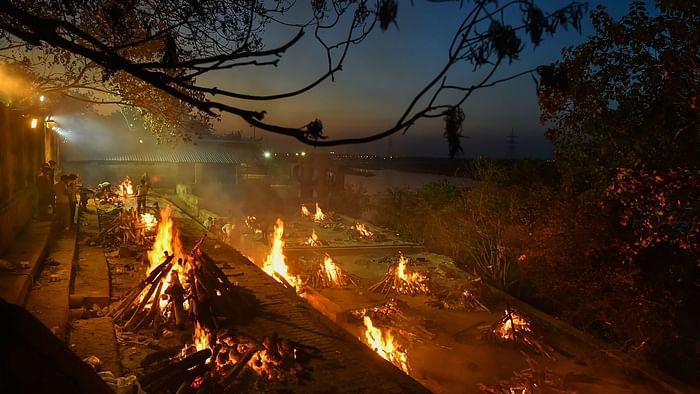prasad1
Active member
India surpassed a somber COVID milestone Thursday, confirming more than 200,000 new cases in a single day as patients and doctors grapple with a shortage of beds and cities announce curfews.
Coronavirus cases had been declining in India for months after reaching a peak last September. But new cases started ticking up last month. Now, they're doubling every ten days or so. Thursday's tally was India's highest since the pandemic began – more than double the previous 2020 peak.
"There are newer variants of concern that are emerging in India which are probably the biggest reason why the speed at which the cases are rising is almost exponential," said epidemiologist Giridhara Babu of the Public Health Foundation of India.
Babu says the characteristic feature of India's second wave is that most people are asymptomatic. "But when the surge occurs, even 5 to 10% will be a large number requiring hospitalization," he said.
India's health infrastructure has started to crack under the strain. Hospitals in many cities are running out of beds and oxygen. In the western Indian city of Ahmedabad, there was a queue of more than 100 ambulances waiting to bring COVID patients into one hospital. Patients have died while waiting to get a bed, and crematoriums and burial grounds are reportedly overloaded.
Despite rising infections, millions are attending a Hindu pilgrimage in northern India. Thousands of people, often maskless, have been attending political rallies in several states voting in local elections throughout April. Cases are shooting up in those states, and politicians who've been on the campaign trail, including Prime Minister Narendra Modi, are facing criticism.
"Look at how our leaders are behaving," says Vineeta Bal, an immunologist at the Indian Institute of Science, Education and Research. "Who are we going to emulate? Just emulate the leaders and we can do whatever we want."
There is no nationwide stay-at-home order in India, but more than a dozen cities have announced curfews. In the capital New Delhi, there are stringent restrictions on movement during weekends. Similar curbs are in place in the financial capital Mumbai on all days of the week.
India's second wave has also coincided with a dwindling supply of coronavirus vaccines. Hundreds of vaccination centers closed temporarily after running out of stock. India has been using the AstraZeneca vaccine and another homegrown formula, both manufactured in India, to inoculate its population of nearly 1.4 billion. It has administered more than 110 million doses so far.
The Indian government is looking to ramp up its vaccine supply and has fast-tracked approvals for widely used foreign-made vaccines like the Pfizer and Moderna ones.

 www.npr.org
www.npr.org
Coronavirus cases had been declining in India for months after reaching a peak last September. But new cases started ticking up last month. Now, they're doubling every ten days or so. Thursday's tally was India's highest since the pandemic began – more than double the previous 2020 peak.
"There are newer variants of concern that are emerging in India which are probably the biggest reason why the speed at which the cases are rising is almost exponential," said epidemiologist Giridhara Babu of the Public Health Foundation of India.
Babu says the characteristic feature of India's second wave is that most people are asymptomatic. "But when the surge occurs, even 5 to 10% will be a large number requiring hospitalization," he said.
India's health infrastructure has started to crack under the strain. Hospitals in many cities are running out of beds and oxygen. In the western Indian city of Ahmedabad, there was a queue of more than 100 ambulances waiting to bring COVID patients into one hospital. Patients have died while waiting to get a bed, and crematoriums and burial grounds are reportedly overloaded.
Despite rising infections, millions are attending a Hindu pilgrimage in northern India. Thousands of people, often maskless, have been attending political rallies in several states voting in local elections throughout April. Cases are shooting up in those states, and politicians who've been on the campaign trail, including Prime Minister Narendra Modi, are facing criticism.
"Look at how our leaders are behaving," says Vineeta Bal, an immunologist at the Indian Institute of Science, Education and Research. "Who are we going to emulate? Just emulate the leaders and we can do whatever we want."
There is no nationwide stay-at-home order in India, but more than a dozen cities have announced curfews. In the capital New Delhi, there are stringent restrictions on movement during weekends. Similar curbs are in place in the financial capital Mumbai on all days of the week.
India's second wave has also coincided with a dwindling supply of coronavirus vaccines. Hundreds of vaccination centers closed temporarily after running out of stock. India has been using the AstraZeneca vaccine and another homegrown formula, both manufactured in India, to inoculate its population of nearly 1.4 billion. It has administered more than 110 million doses so far.
The Indian government is looking to ramp up its vaccine supply and has fast-tracked approvals for widely used foreign-made vaccines like the Pfizer and Moderna ones.

India Confirms More Than 200,000 Coronavirus Cases In A Day
Thursday's tally was India's highest since the pandemic began – more than double the previous 2020 peak.


